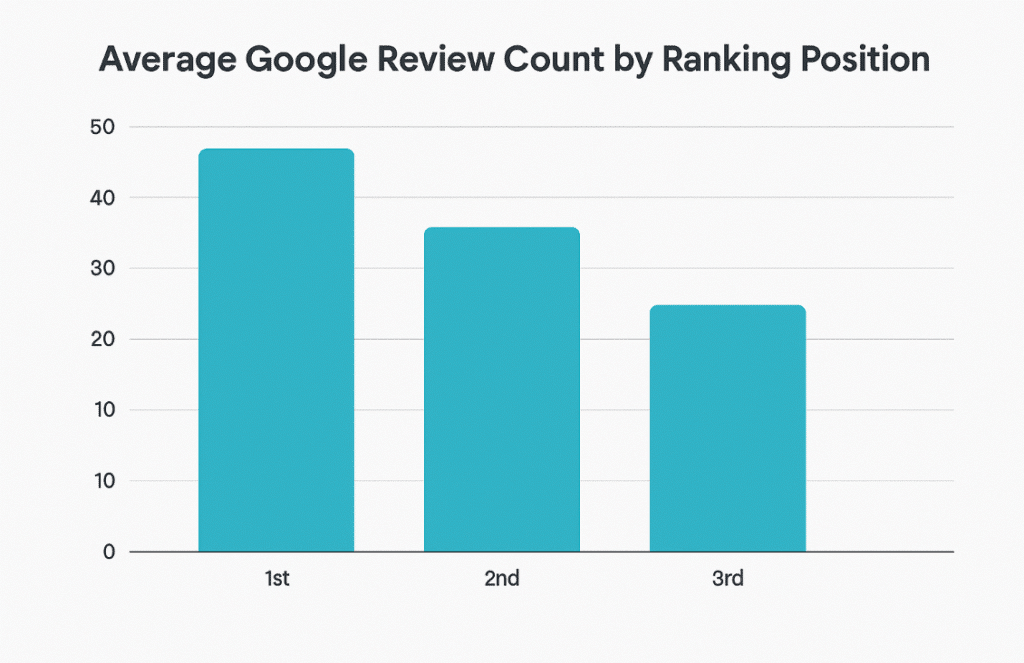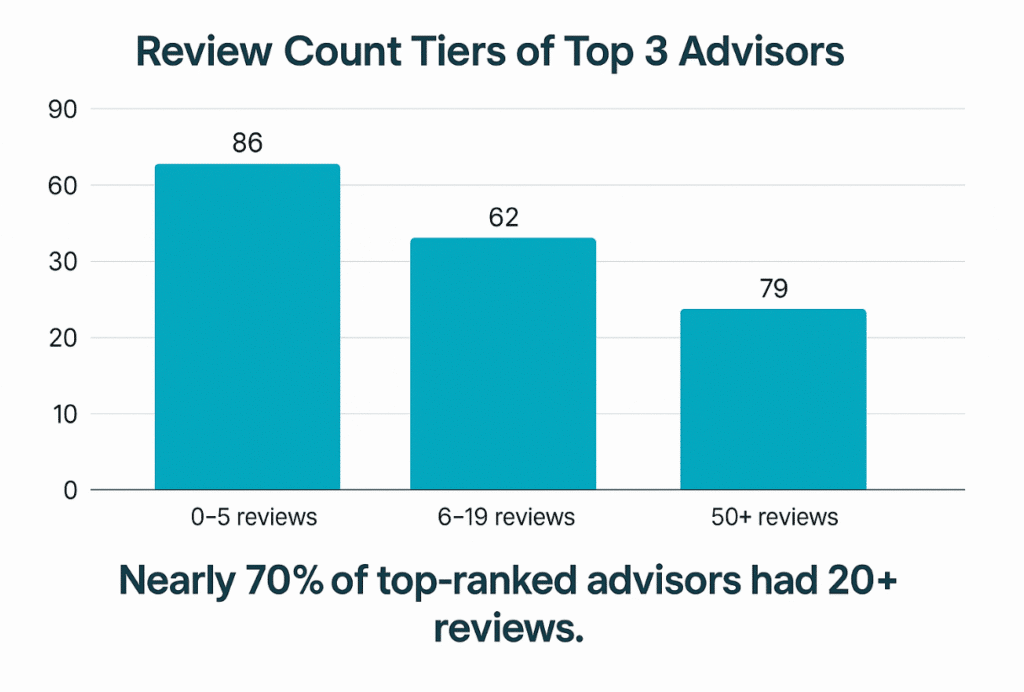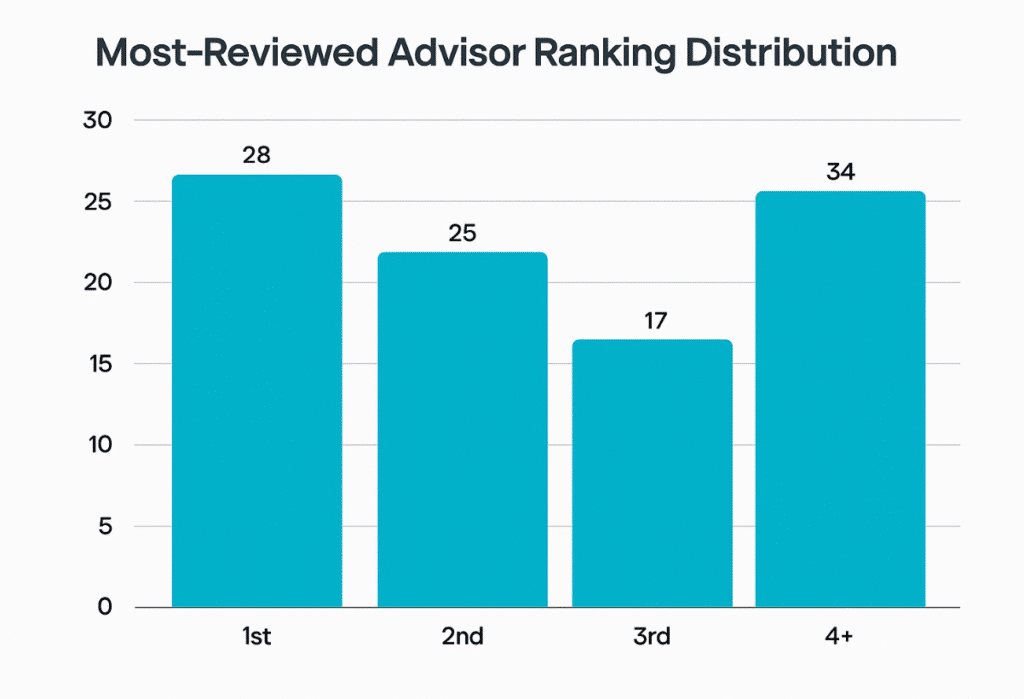Note: Local search rankings vary based on the searcher’s geographic location. While this data provides a helpful overview of how reviews impact rankings, your local results may differ.
Google Reviews—The Underrated Ranking Factor
When financial advisors think about SEO, the focus often lands on keywords, backlinks, and website optimization. While these elements are important, there’s a powerful – and often overlooked – factor that can significantly influence your visibility: Google reviews.
Recent insights from local SEO expert Joy Hawkins suggest that the number of Google reviews may have a more substantial impact on local rankings than keywords in the business name or even backlinks.
To explore this further, we analyzed data from 100 U.S. cities, examining the top three Google Business Profile (GBP) results for financial advisors in each location. The findings reveal that Google reviews play an important role, not just in local search rankings, but also in AI-generated search results.
Why Google Reviews Matter More Than Ever
1. Google Reviews Help You Rank
Local SEO depends on three primary signals: proximity, relevance, and prominence. Google reviews directly influence prominence by signaling how visible and established your business is. In our analysis, review count was one of the most consistent predictors of local ranking, outperforming traditional SEO metrics like backlinks and title tags.
2. Google Reviews Build Trust (Especially for YMYL)
For financial advisors, who operate in a “Your Money or Your Life” (YMYL) category, trust is key. Google holds YMYL websites to a higher standard, prioritizing credibility and reliability in search rankings. Google reviews serve as one of the most public, accessible, and permanent indicators of that trust. They don’t just boost rankings—they build confidence with prospective clients.
Methodology: What We Studied
To better understand how reviews impact local rankings, we conducted a comprehensive study of Google Business Profiles across 100 U.S. cities. We focused specifically on the top 3 local results for financial advisors in each market to see how review volume compared to other traditional SEO factors.
We analyzed:
- 100 U.S. cities
- Top 3 Google Business Profile results in each city
- Metrics including:
- Number of Google reviews
- Ranking position
- SEO signals: Page Authority (PA), Domain Authority (DA), Title Tag Optimization
Key Findings from the Data
When we crunched the numbers, we found that the differences between top-ranking and lower-ranking profiles were too significant to ignore.
Summary Insights:
- Only 4 top 3 ranked advisors had 0 reviews
- Median review count among top 3 advisors: 20.5
- Top 3 advisors averaged 45.6 reviews
- Advisors ranked 4th and 5th averaged only 18.67 reviews — less than half of the average of those in positions 1-3

Review Distribution (Top 3 Rankings):
The spread of review counts among the top 3 advisors reveals how varied the landscape is. While some advisors rank with fewer than 5 reviews, others have 50 or more, showing there’s room to grow and compete at every stage. Here’s how the distribution breaks down:
- 0–5 reviews: 86 advisors
- 6–19 reviews: 62 advisors
- 20–49 reviews: 79 advisors
- 50+ reviews: 69 advisors
We found that 48 advisors had more than 100 Google reviews, and many of them were among the top local rankings in their markets.

Reviews Aren’t the Whole Ranking Story
Google reviews are one of the strongest local ranking signals, but they’re not the only factor.
Our data shows that in 87% of cities, the top three search results didn’t exactly mirror the businesses with the highest review counts. But that doesn’t mean reviews aren’t working. In fact:
- The most-reviewed advisor ranked #1 in 28 cities
- They appeared in the top 3 in 66 out of 100 cities
The key takeaway? Reviews matter – a lot – but they work in tandem with other local SEO signals like proximity, relevance, and business profile quality.

SEO Metrics vs. Google Reviews
While we expected to see strong SEO signals like high Domain Authority or well-optimized title tags correlate with top rankings, the results were mixed. Traditional SEO metrics weren’t consistent indicators of local ranking success.
What stood out? Review volume.
Across the board, the review count was the strongest and most reliable signal correlated with the top 3 rankings.
Google Reviews and AI Search (AEO)
As AI-driven search evolves, reviews are playing a bigger role in how businesses are discovered and recommended. While local SEO relies heavily on Google reviews, AI tools look at a broader mix of trust signals.
Google reviews remain the most visible and weighty factor. Still, platforms like Yelp, Facebook, niche directories, and advisor-specific platforms designed for compliant review collection and display (i.e. Amplify Reviews and Wealthtender) can also contribute to a business’s reputation footprint. AI-driven search tools like ChatGPT, Bing Copilot, and Google’s SGE (Search Generative Experience) now pull and summarize information from trusted sources. Google reviews, due to their permanence and public nature, are one of the most trusted.
A strong review profile increases the likelihood of your firm appearing in AI-generated “top picks” or recommendations, further bridging the gap between local SEO and AI visibility.
What Financial Advisors Should Do
You don’t need hundreds of reviews, but you do need more than 5.
Aim for 20–49 reviews to remain competitive in most local markets.
Think of reviews as:
- Free
- Public
- Permanent
- High-trust
Investing in a review strategy offers both immediate SEO benefits and long-term brand credibility.
How to Build a Review Strategy (The Right Way)
- Request reviews after meetings via email or SMS (one at a time, not bulk)
- Use QR codes or branded short links
- Avoid bulk email requests or incentivizing reviews, which can violate platform guidelines and diminish trust
- Respond to all reviews to show engagement
- Use review snippets on your website with schema markup for added SEO benefit
Google reviews are now a dual-purpose ranking factor: they help you rank and help clients trust you.
The data is clear: reviews aren’t just about vanity—they’re an important lever for visibility, credibility, and lead quality.
Financial advisors who invest in a strong, compliant review profile today are positioning themselves for future success in both traditional and AI-driven search.
Need help building a sustainable SEO and AEO strategy? Our agency can help. Set up a no-cost Q&A session to learn more about how we can support your business.
Notes: Data Set
Brent is the Principal and founder of Advisor Rankings - a specialized SEO and AI search optimization agency dedicated to helping independent financial advisors strengthen authority, boost traffic, and attract high-quality leads online.
- Brent Carnduff


